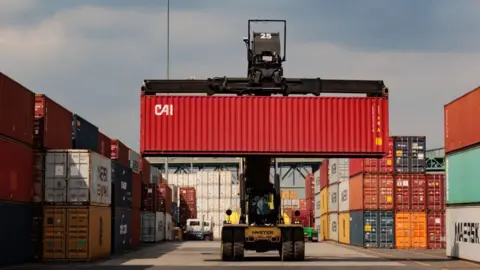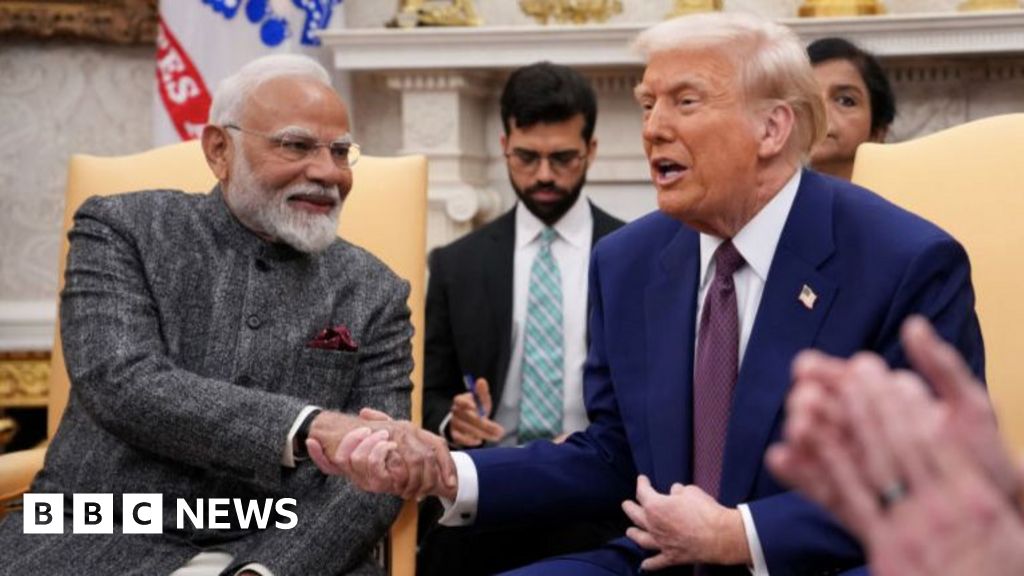
 Getty Images
Getty Images
US President Donald Trump is sharpening plans to hit exports from countries that he says have trade policies that are unfair to the US.
On Thursday, Trump signed a memo that instructed staff to develop custom tariffs for each country, taking into account features such as their existing tariffs, exchange rates, trade balances and other rules.
In outlining its concerns, the White House said that tariffs imposed by other countries were not necessarily the biggest issue, singling out the European Union for other policies the Trump administration said put US exporters at a disadvantage.
While big questions remain about the plans, the announcement is likely to kick off trade talks around the world.
Which countries could be affected?
The memo signed by the president asked that staff report back for a plan for "reciprocal trade and tariffs" within 180 days.
Commerce Secretary Howard Lutnick said his team would be ready to hand a plan to the president by 1 April.
Trump cast his plan for so-called reciprocal tariffs as part of his effort to bring investment to the US and boost manufacturing.
"If you build your product in the United States, there are no tariffs," he said, adding that he was "just doing what was fair".
"In almost all cases, they're charging us vastly more than we charge them but those days are over," he said. "This should have been done a long time ago."
As well as the European Union, Trump's moves are expected to have an impact on trade relationships with countries such as India, Vietnam and Thailand, which have relatively higher tariffs and rely on the US as a big market for exports.
Trump signed the memo ahead of a meeting with Indian Prime Minister Narendra Modi, who has already taken steps to reduce tariffs on key items such as motorcycles, which Trump made an issue during his first term.
In recent days, officials in Thailand and Vietnam have also said they were reviewing trade with the US.
Ahead of Trump's announcement, the European Union said it was committed to "maintaining a close partnership with the US".
"We will continue to seek constructive engagement," Olof Gill, the commission's spokesperson for trade said. "At the same time, we stand ready to protect our interests."
What are reciprocal tariffs?
A tariff is a tax on imports collected by the government. It is paid by the company importing the good.
Countries typically erect tariffs in a bid to protect certain sectors from foreign competition.
Historically, the US has championed free trade and kept the majority of its tariffs low, except on certain products such as footwear and, more recently, steel and aluminium.
On average, the US has 3.4% tariff, compared to 5% with Europe, according to the WTO.
In setting out its plans, the White House cited objections to tariffs such as the 10% tax that US-made cars face in Europe, compared with the 2.5% tariff the US applies to cars brought into the US.
The White House also said that Brazil charges an 18% tariff on ethanol imports, while the US charges a 2.5% tariff on the same product.
But officials made clear that the US intends to use tariffs to challenge policies farther afield, citing concerns about the digital services taxes many countries, including Canada and the UK, have unveiled against Big Tech firms - many of which are US-based - as well as Europe's rules for its Value Added Tax (VAT), a kind of sales tax.
What impact could tariffs have on the economy?
Thursday's announcement comes after a string of tariff-related moves from the new administration.
Earlier this week, Trump ordered the US to start charging a 25% import tax on all steel and aluminium brought into the country, ending exemptions for countries including the European Union, UK and Brazil. That is due to go into effect next month.
He also raised tariffs on all goods from China to 10% and threatened to hit imports from Canada and Mexico with duties of 25%, a plan that has been put on hold until March.
John Cassidy, chief executive of Red Cedar Investment Management, said Trump's string of rapid-fire tariff announcements had unnerved Wall Street, which "does not like the unknown".
But he warned against over-reacting, noting that tariffs that Trump imposed during his first term had a relatively mild impact on the US economy.
"I think Trump's playing a hand here and I think he's got a very strong hand to play." he said.
However, Alex Durante, economist at the Tax Foundation, said it remained to be seen what changes could result from Trump's moves.
He does not think tariffs are the best strategy for dealing with trade complaints, given the costs and uncertainty they introduce for US firms and risks of retaliation.
"I think we're inching toward more and more tariffs with each coming week and further escalation of a trade war with other countries," he said.
He noted that Trump in his first term walked away from the Trans Pacific Partnership, a free trade agreement that had been intended to address some of these same issues with countries in Asia.
"They were open to doing this without having to put the US through more trade uncertainty," he said.
Trump has dismissed concerns about collateral trade damage, saying his plans will boost manufacturing in the US over the long term.
"What's going to go up is jobs are going to go up," he said. "Prices could go up somewhat short term, but prices will also go down."
But surveys indicate the US public remains concerned about the cost of living and is unconvinced about the benefits of tariffs, which economists have warned are likely to lead to higher prices for US businesses and households.
A recent Marquette Law School poll found just 24% of respondants believe tariffs will help the US economy, including just under half of Republicans and just 12% of independents and 4% of Democrats.
"The question is are these tariffs going to lead to higher inflation, higher costs of goods," said Charles Franklin, director of the poll. "The fairness argument is probably a good argument for the president to make but the price impact is much more of a hard thing to sell".
Reporting contributed by Tom Espiner

 2 hours ago
4
2 hours ago
4









